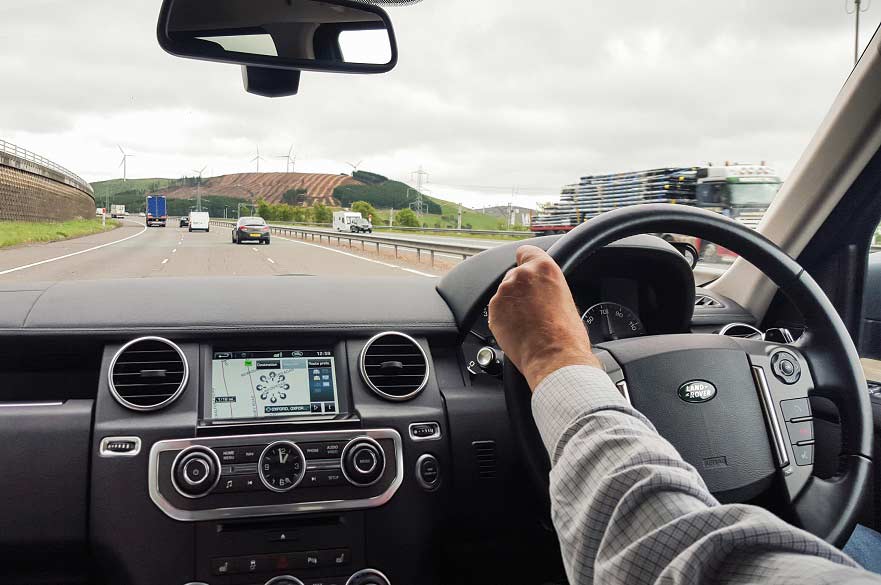Motorists pay less attention to what’s happening on the road during familiar journeys, study suggests
The more familiar a motorist is with a journey, the less they pay attention to what’s happening on the road, according to a new study.
By Dave Rogers | Published on 22 February 2018
Categories: Press office; School of Social Sciences;

Traffic and transport psychologists at Nottingham Trent University, who led the research, are urging motorists who often undertake the same routes on well-known roads to take extra care.
The study involved an experienced driving instructor travelling the same route 28 times over the course of a month – a similar number of times to the typical commute – whilst wearing specialist eye-tracking equipment.
The 25-minute journey incorporated two types of suburban roads, dual and multi-lane carriageways, and a country road.
The researchers collected data on how much time the driver spent looking in their mirrors, at the road ahead, into side roads and adjacent lanes, as well as off the road altogether.
They found that, as the driver became more familiar with the drive, the less time they spent looking at the road ahead, where important hazards were most likely to occur, and the more time they spent looking off the road.
The amount of time spent looking at the road ahead decreased by almost a quarter (22%) when comparing the first five drives with the final five, whilst time spent looking off road increased by almost a fifth (19%).
“The majority of journeys by car take place on familiar roads, with many being driven, time and time again”, said lead researcher Angie Young, a psychologist in Nottingham Trent University’s School of Social Sciences.
She said: “Our findings show that roadway familiarity appears to shift the driver’s attention away from the road to areas irrelevant to driving safety, such as scenery, trees and houses.
“This may reflect a decrease in arousal due to the repetitive nature of the task, with a related desire to look for new stimuli to redress the balance.
“What is interesting is that we get these changes even with a really experienced driver, who knew they were under observation, and across several road types.
“The sudden appearance of a hazard is more problematic if the driver is not looking at the road, and we’d ask all motorists who undertake repetitive journeys to take extra care.”
David Crundall, Professor of Psychology at Nottingham Trent University, added: “The amount of time spent looking off-road increased across all five road sections, whilst route familiarity led to less time looking at the road ahead in four out of the five sections.
He said: “Studies of crash location often show a spike for accidents occurring close to the driver’s home, even when exposure is controlled for. The current results help us to understand why this might happen.”
The research is published in the journal Traffic Psychology and Behaviour.
Notes for Editors
Press enquiries please contact Dave Rogers, Public Relations Manager, on telephone +44 (0)115 848 8782, or via email.
About Nottingham Trent University
- Nottingham Trent University was named University of the Year 2017 at the Times Higher Education Awards and Modern University of the Year in the Times and Sunday Times Good University Guide 2018. The award recognises NTU for its strong student satisfaction, quality of teaching, overall student experience and engagement with employers.
- Nottingham Trent University (NTU) has been awarded the highest, gold, rating in the Government’s Teaching Excellence Framework for its outstanding teaching and learning.
- NTU is one of the largest UK universities with nearly 28,000 students and more than 3,500 staff across four campuses, contributing £496m to the UK economy every year. It is one of the most environmentally-friendly universities, containing some of the country’s most inspiring and efficient award-winning buildings.
- The University is passionate about creating opportunities and its extensive outreach programme is designed to enable Nottingham Trent to be a vehicle for social mobility. NTU is the sixth biggest recruiter of students from disadvantaged backgrounds in the country and 95.6% of its graduates go on to employment or further education within six months of leaving.
- NTU is home to world-class research, winning The Queen’s Anniversary Prize in 2015 - the highest national honour for a UK university. It recognised the University’s pioneering projects to improve weapons and explosives detection in luggage, enable safer production of powdered infant formula and combat food fraud.
- With an international student population of approximately 2,600 from around 100 countries, the University prides itself on its global outlook.